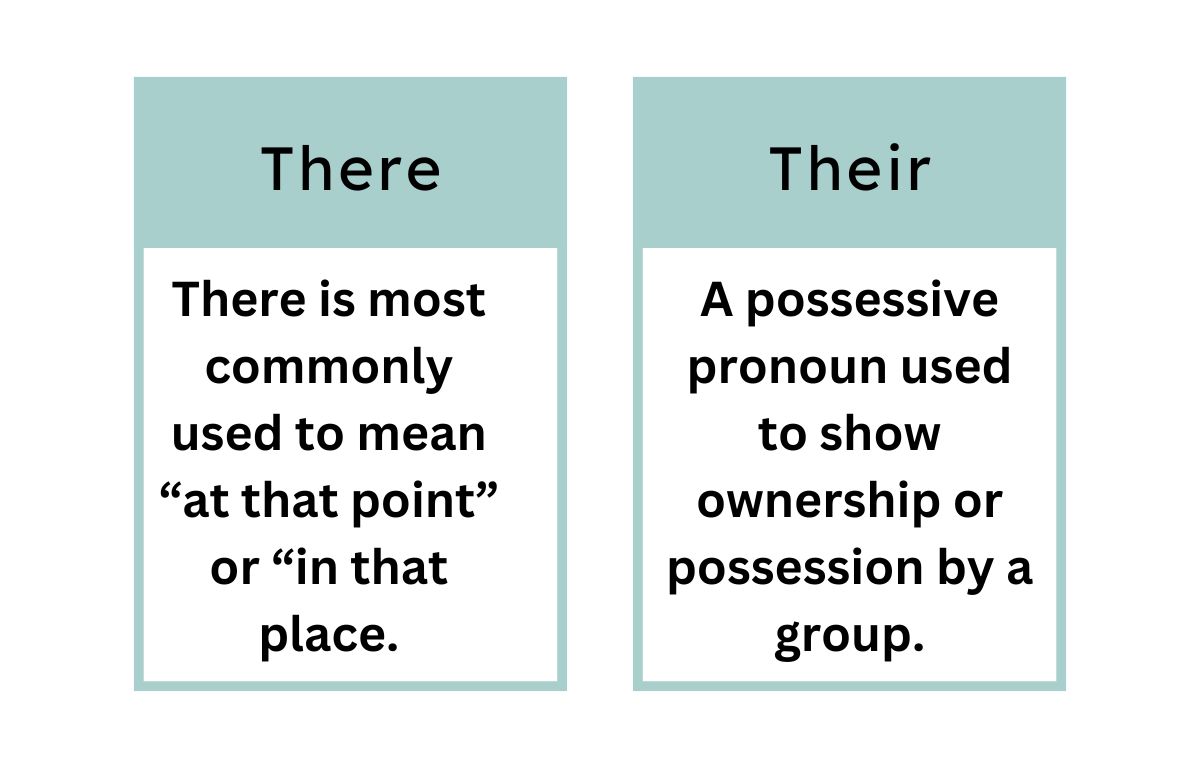Table of Contents
Confusion between ‘There’ and ‘Their’ is common, especially among those learning English. It is a common mistake. To clarify ‘There’ denotes a place or location, as in “The book is over there.” It can also introduce a sentence, like “There is a cat outside.” On the other hand ‘their’ is a possessive pronoun indicating ownership by a group, such as “their car is parked outside.” Recognizing these distinctions is essential for clarity in writing and speaking. Understanding the correct usage of ‘there’ and ‘their’ helps avoid misunderstandings. For further exploration of more differences between ‘there’ and ‘their’, students are advised to refer to the complete article below.
Meaning of “There”
The word ‘There’ serves various purposes in English, primarily as an adverb, it specifies a location, such as “over there” or “there is a house.” It helps point out a specific spot or position in relation to the speaker or listener. As a Pronoun, it can replace a noun to avoid repetition, like “Are there any chocolates left?” where “there” stands for “in that place.”
Additionally, “there” can imply existence or presence, as in “there are many reasons for this decision.” It introduces a statement or idea, emphasizing the existence of something. In informal contexts, ‘there’ can also be used as a filler word at the beginning of a sentence to gain attention or start a conversation. Overall, ‘there’ is a versatile word crucial for indicating location, existence, and starting statements in English communication.
Meaning of “Their”
‘Their’ is a third-person plural possessive pronoun used to indicate that something belongs to multiple individuals or entities previously mentioned or understood. It implies ownership or association within a group. For instance, ‘their opinions differed on the matter’ suggests that multiple people held differing viewpoints. In written and spoken English, “their” helps avoid specifying each person individually, making communication more efficient and respectful of collective identity.
It is distinct from “their,” which refers to something owned by multiple people, as in “the decision was theirs to make.” This pronoun plays a crucial role in expressing possession and affiliation in various contexts, enhancing clarity and inclusivity in language usage.
Difference Between There and Their
The main difference between ‘there’ and ‘their’ lies in their function and meaning within sentences. ‘There’ is primarily used to indicate a place or location, such as in the sentence ‘put the book over there.’ On the other hand, ‘their’ is a possessive adjective that indicates belonging to or associated with a group of people or things, as in ‘Their car is parked outside.’ More differences have been tabulated below.
| Difference Between There and Their | ||
| Features | There | Their |
| Meaning | ‘There’ refers to the place or location. | On the other hand, ‘Their’ indicates possession by others. |
| Usage | Used as an adverb or a pronoun. | Used as a possessive determiner. |
| Examples | She is over there. | Their house is beautiful. |
| Function | Specifies where something is located | Shows ownership by a group. |
| Context | Generally used to indicate a position. | Commonly refers to belongings. |
| Type | ‘There’ is a type of demonstrative adverb. | ‘Their’ is a type of possessive adjective. |
| Sentences | Put it down there, please. | Their car broke down. |
| Subject | Directs attention to a place. | Indicates belonging to a group. |
| Grammatical | Often used to indicate direction. | Essentials in indicating ownership. |
Uses of There
Below we have discussed a few common uses, but “there” is a versatile word in English with various applications depending on context.
- Adverb of Place: To indicate a location or position, such as “over there” OR “right there.”
- Expletive Construction: In sentences like ‘There is a book on the table,’ where “there” functions as a dummy subject.
- Existence or Occurrence: As in ‘There are many reasons to visit,” indicating the existence of reasons.
- Idiomatic Phrase: Such as “There you go!” to indicate agreement or satisfaction, or “there” used to comfort someone.
Uses of Their
The word “their” is a possessive determiner used to indicate belonging to a group of people or things. These uses highlight how “their” is employed to denote possession or affiliation in English Sentences.
- Possession: Shows ownership or belonging, such as “Their house is beautiful.”
- Indefinite Pronoun: Used when referring to people in a general sense, like “Everyone brought their own lunch.”
- Gender Neutrality: Avoids specifying gender, as in “Each student has their own desk.”
- Respectful form: In some contexts, used to show respect or formality, like, “Their Majesties attended the ceremony.”





 50+ Rhyming Words in English List, Check...
50+ Rhyming Words in English List, Check...
 Essay Writing Format for Students in Eng...
Essay Writing Format for Students in Eng...
 Essay on My Best Friend, 10 Lines, 100, ...
Essay on My Best Friend, 10 Lines, 100, ...









